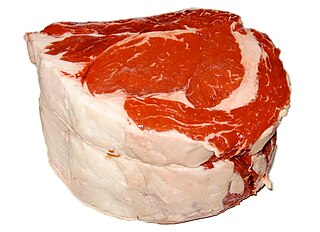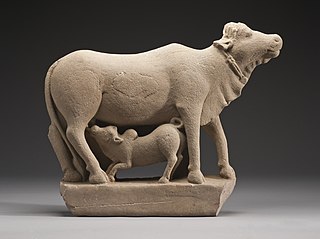
Beef is the culinary name for meat from cattle.

Due to the multiple benefits from cattle, there are varying beliefs about cattle in societies and religions. In some regions, especially most states of India, the slaughter of cattle is prohibited and their meat may be taboo.

Dorothy Louise Slaughter was an American politician elected to 16 terms as a United States Representative from New York, serving from 1987 until her death in 2018. She served as the Dean of the New York Congressional Delegation for the last few terms as Congresswoman before her death.

Bookanakere Siddalingappa Yediyurappa, often referred to by his initials BSY, is an Indian politician and statesman currently serving as a member of the Bharatiya Janata Party Parliamentary board committee since 17 August 2022, termed as the highest office of authority in the party. He served as the 13th Chief Minister of Karnataka, and currently a Member of the Karnataka Legislative Assembly. He is a member of the Bharatiya Janata Party. He is also the only politician so far in Karnataka to have served four times as Chief Minister and three times as Leader of the Opposition in the Karnataka Legislative Assembly. He is the longest serving Chief Minister of Karnataka from BJP. He is a MLA from Shikaripura constituency in Shimoga district, from where he has been elected eight times.

Sri Sri Raghaveshwara Bharathi (originally, Harish Sharma), is an Indian religious guru and the present mathadhis (Guru) of Shri Ramachandrapura Mutt, Hosanagara in Shimoga district in the Indian state of Karnataka. He is the 36th mathadhis of Shri Ramachandrapura Math. He took sannyasa from Jagadguru Sri Ragavendra Bharati Mahaswamiji the previous mathadhis, in April 1994. He is a follower of Advaita Vedanta.

Shambo was a black Friesian bull living in the interfaith Skanda Vale Temple near Llanpumsaint in Wales who had been adopted by the local Hindu community as a sacred animal. He came to public attention in April 2007, when a routine skin test for bovine tuberculosis tested positive, indicating he may have been in contact with the bacterium that causes the disease. As a result, the Welsh Government required that the bull be slaughtered. Skanda Vale disputed this and campaigned for a reprieve, expressing their belief that the sanctity of all life is the cornerstone of Hinduism. They were backed in this stance by the Hindu religious community at large. Farmers supported the Welsh Government's policy that cattle which tested positive to the skin test be destroyed in the interests of other local cattle.
The Lokayukta is the Indian Parliamentary Ombudsman, executed into power, through and for, each of the State Governments of India. It is brought into effect in a state, after passing the Lokayukta Act in respective state Legislature and a person of reputable background is nominated to the post. The post is created to quickly address grievances against the working integrity and efficiency of the government or its administration. Once appointed, Lokayukta cannot be dismissed or transferred by the government, and can only be removed by passing an impeachment motion by the state assembly, making it a powerful deterrent against corruption and mal-administration of the governing system.
The cow protection movement is a predominantly Indian religious and political movement aiming to protect cows, whose slaughter has been broadly opposed by Hindus, Buddhists, Jains, Zoroastrians and Sikhs. While the opposition to slaughter of animals, including cows, has extensive and ancient roots in Indian history, the term refers to modern movements dating back to colonial era British India. The earliest such activism is traceable to Namdhari (Kooka) Sikhs of Punjab who opposed cow slaughter in the 1860s. The movement became popular in the 1880s and thereafter, attracting the support from the Arya Samaj founder Swami Dayananda Saraswati in the late 19th century, and from Mahatma Gandhi in the early 20th century.

Cattle slaughter in India, especially cow slaughter, is controversial because of cattle's status as endeared and respected living beings to adherents of Hinduism, Jainism and Buddhism; while being an acceptable source of meat for Muslims, Christians and Jews. Cow slaughter has been shunned for a number of reasons, specifically because of the cow's association with the god Krishna in Hinduism, and because cattle have been an integral part of rural livelihoods as an economic necessity. Cattle slaughter has also been opposed by various Indian religions because of the ethical principle of Ahimsa (non-violence) and the belief in the unity of all life. Legislation against cattle slaughter is in place throughout most states and territories of India.

Tannery Road is located in the North East of Bangalore Cantonment, India. It is a 4 km long narrow road with around 700 shops, named after the tanneries of the British India period located at the end of the Road. Tannery Road was officially renamed as Dr B S Ambedkar Road many years back, but it still is referred to by its old name. Tannery Road touches Fraser Town, Richards Town, Giddappa Block, Periyar Nagar and Pillanna Garden. The Tannery Road area is highly populated with a high density. The suburb presents a picture which is a shocking contrast to the hi-tech image of Bangalore. As elections has not brought about any changes, the residents express disillusionment with politicians and politics. Pot-holes and broken pavements are a common feature of Tannery Road, in addition to heavy traffic, water problems, garbage, etc. There is scant respect for traffic rules, and vehicles of all types zoom past in all directions. Residents have to dodge puddles of dirty water and garbage, to move around.

Bengaluru North University (BNU) is a state university located in Tamaka, near NH 75 in Kolar, Karnataka, India. The university was established in 2017 by the Government of Karnataka through the Karnataka State Universities (Amendment) Act, 2015 trifurcating Bangalore University by creating Bengaluru North University and Bengaluru Central University.
On 9 October 2015, Prashanth Poojary, a Hindu man from the town of Moodabidri in Dakshina Kannada,Karnataka, was killed by Muslim extremists.
Animal welfare and rights in India regards the treatment of and laws concerning non-human animals in India. It is distinct from animal conservation in India.
2017 in India highlights the national/Daily level events during the year.
In India, cow vigilante violence is the use of physical force in the name of "cow protection". Since 2014, mob attacks targeting mostly illegal cow smugglers, but in some cases even licensed cow traders, have become prominent. There is a debate on whether there has actually been any change in the number of such incidences, as government data points out to reduced communal tensions post 2014. Cattle slaughter is banned in most states of India. Recently emerged cow vigilante groups, claiming to be protecting cattle, have been violent leading to a number of deaths. Cow-protection groups see themselves as preventing cattle theft and smuggling, protecting the cow or upholding the law in an Indian state which bans cow slaughter. According to a Reuters report, a total of 63 cow vigilante attacks had occurred in India between 2010 and mid 2017, most after Prime Minister Narendra Modi came to power in 2014. In these attacks between 2010 and June 2017, "28 Indians – 24 of them Muslims – were killed and 124 injured", states the Reuter's report.
Cattle theft, more commonly cattle raiding or cattle lifting, is a property crime in India. In the ancient and medieval era India texts, stealing cattle is described as a crime and sin, a motif that appears in Hindu mythologies.

Karnataka State Rural Development and Panchayat Raj University (KSRDPRU) is a state university located at Gadag district, Karnataka, India. It was established in 2016 by the Government of Karnataka under the Karnataka State Rural Development and Panchayat Raj University Act, 2016 to focus on education towards rural development.

Legislative Assembly elections were held in Uttar Pradesh from 10 February to 7 March 2022 in seven phases to elect all 403 members for the 18th Uttar Pradesh Legislative Assembly. The votes were counted and the results were declared on 10 March 2022.
Cattle slaughter, especially cow slaughter is a controversial topic in Sri Lanka just like neighbouring India because of the cattle's traditional status as an endeared and respected living being to some sects of Hinduism and Buddhism while being considered an acceptable source of meat by Muslims as well as Christians and by some Hindus and Buddhists. Cows are killed for the purpose of obtaining beef. The proposals on banning cattle slaughter were initiated in the past by pressure groups and politicians but the legislation to restrict cattle slaughter was not materialised and passed by any of the previous governments. The call for eradicating cattle slaughter was put forward by the Sinhala Buddhist groups in the past. In September 2020, a proposal was initiated to ban cattle slaughter. On 29 September 2020, the government revealed that the cattle slaughter would be officially banned after the implementation of scheme. The move was deemed primarily due to the influence of majority Buddhist population. However government ruled out the religious impact and insisted that the cattle slaughter ban is to encourage agriculture in the country.

Stray cows or stray cattle are animals such as cows, bulls, oxen and buffaloes that roam freely. A cow is considered "stray" when its owner no longer claims ownership or its owner cannot be determined.











